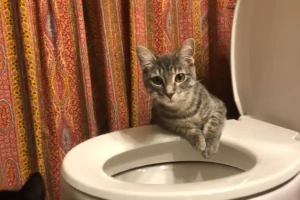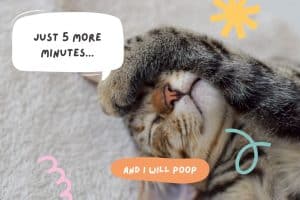Cats not pooping? Let’s get to the bottom of this.
If your feline friends are not pooping as they should, there could be a variety of reasons behind it. Here are some possible causes and solutions to help address the issue:
Checking for Constipation
Have you noticed your furry friend straining in the litter box but not producing anything? This could be a sign of constipation. Keep an eye out for hard, dry stools or decreased frequency of bowel movements. If your cat is showing signs of discomfort when trying to go to the bathroom, they might be constipated.
To help alleviate your cat’s discomfort, try increasing their fiber intake. You can mix in a bit of pumpkin or psyllium husk with their food to help promote regular bowel movements. Additionally, ensure your cat has access to fresh water at all times to prevent dehydration, which can contribute to constipation.
If your cat’s constipation persists, it’s best to consult with your veterinarian. They can provide further guidance and recommend laxatives or other treatments to help your feline friend get back to regular pooping.
Diet and Hydration
The diet and hydration levels of your cats play a crucial role in their overall digestive health. A diet lacking in fiber can lead to constipation, so make sure your cat’s food contains enough nutrients to support healthy digestion. Additionally, dehydration can also cause constipation in cats, so always ensure they have access to plenty of water throughout the day.
To promote regular bowel movements in your cats, consider moist food options that can help with hydration. You can also try incorporating broth or watered-down wet food into their diet to increase their water intake. Remember, a balanced diet and proper hydration are key to keeping your cats’ digestive systems running smoothly.
Unique Insight: Consider feeding your cat probiotic supplements to support their gut health. Probiotics can help maintain a healthy balance of good bacteria in their digestive system, promoting regularity and overall well-being. Be sure to consult with your vet before adding any supplements to your cat’s diet.
Stress and Anxiety
If your cats are not pooping, stress and anxiety could be to blame. Just like humans, cats can experience digestive issues when they are feeling anxious or tense. Changes in their environment, new additions to the family, loud noises, or even a trip to the vet can all trigger stress in your furry friends. To help your cats relax and regulate their bowel movements, create a calm and safe space for them, provide plenty of hiding spots, and offer interactive toys to keep them engaged and distracted. Additionally, consider using pheromone diffusers or calming supplements to help alleviate their anxiety.
Medical Conditions
When your cats are not pooping, it’s important to consider underlying medical conditions that may be causing their constipation. Issues like dehydration, dietary changes, blockages, or even more serious conditions like kidney disease or megacolon could be at play. If your cats are consistently struggling to poop, it’s crucial to seek veterinary care. Your veterinarian can conduct a physical exam, run tests, and provide the necessary treatment to help your furry friends feel better. Remember, early detection and treatment can make a significant difference in your cats’ health.
Potential Medical Conditions:
- Dehydration: Ensure your cats have access to fresh water at all times.
- Dietary issues: Check if your cats are getting enough fiber in their diet.
- Blockages: Watch out for signs of ingesting foreign objects or hairballs.
- Kidney disease: Monitor your cats’ kidney function regularly.
- Megacolon: Consult your vet if your cats have recurring constipation issues.
Remember, keeping a close eye on your cats’ bathroom habits and seeking prompt veterinary attention can help address any potential health issues quickly and effectively.
Litter Box Issues
When your cats are not pooping, one possible culprit could be litter box issues. Cats are notoriously finicky about their bathroom habits, so ensuring a clean and inviting litter box setup is crucial. Make sure there is enough clean litter in the box and that it is scooped regularly to prevent any odors that may deter your cats from using it. Additionally, the location of the litter box is important – it should be in a quiet, accessible spot away from their food and water.
If you have multiple cats, consider providing one litter box per cat plus an extra one to prevent competition or territorial issues. Cats can be particular about the type of litter they prefer, so experiment with different varieties to see what your furry friend likes best. Lastly, ensure the litter box is large enough for your cat to comfortably turn around and dig, as some cats may avoid using it if they feel cramped or restricted.
Tips for a Cat-Friendly Litter Box Setup: 1. Place litter boxes in quiet, accessible locations. 2. Scoop litter daily and change it completely at least once a week. 3. Provide one litter box per cat plus an extra one. 4. Experiment with different types of litter to find your cat’s preference. 5. Ensure the litter box is large enough for your cat to comfortably use.
Exercise and Activity
If your cats are not pooping regularly, lack of exercise and physical activity could be a contributing factor. Just like humans, cats need movement to keep their digestive system functioning properly. Encouraging playtime and exercise can help stimulate your cat’s bowel movements and prevent constipation.
Set aside dedicated time each day to engage your cats in interactive play with toys that encourage running, jumping, and hunting behaviors. You can also try puzzle feeders or treat-dispensing toys to keep them mentally stimulated and physically active. If your cat is not used to regular exercise, start slowly and gradually increase the duration and intensity of play sessions.
Regular exercise not only benefits your cat’s physical health but also strengthens your bond and provides mental enrichment. Remember, a happy and active cat is more likely to have regular bowel movements. So, get those feather toys ready and let the playtime begin!
Additional Insight: A simple change in your cat’s environment, such as providing vertical spaces for climbing and perching, can also encourage exercise and help regulate their digestive system. Consider adding cat trees, shelves, or window perches to create vertical territory for your feline friends.
Natural Remedies
If your cats are experiencing constipation, consider adding pumpkin to their diet. Its high fiber content can help regulate their bowel movements. Additionally, hydration is key, so make sure your furry friends have access to fresh water at all times. Probiotics can also aid in maintaining a healthy gut flora, promoting digestion. Another natural remedy is gentle exercise to keep their digestive system moving. Remember to consult with your veterinarian before introducing any new supplements or remedies to your pets’ routine.
Regular Veterinary Check-ups
Regular veterinary check-ups are crucial in monitoring your cats’ overall health, including their digestive system. Through these check-ups, your vet can identify any underlying issues that may be causing constipation in your cats. They can recommend appropriate diet changes or prescribe medications to help alleviate the issue. Early detection of any health concerns is key to ensuring your pets live long, healthy lives. So, schedule those routine check-ups to keep your cats’ well-being in check.
Fun Fact: Cats are known for their meticulous grooming habits, but excessive grooming can be a sign of stress or anxiety, potentially leading to constipation. Stress can manifest in various ways for your feline friends, impacting their digestive system and causing irregular bowel movements. If your cats are not pooping, it might be beneficial to observe their behavior for signs of anxiety or stress such as hiding, excessive grooming, or aggression towards other pets.
If you notice any of these behaviors, it’s essential to create a calm and comfortable environment for your cats, providing them with plenty of opportunities for relaxation and mental stimulation. Introducing interactive toys, puzzle feeders, or calming pheromone diffusers can help alleviate stress and promote regular bowel movements. Additionally, ensure your cats have access to fresh water at all times and a balanced diet rich in fiber to support proper digestion.
Remember, just like humans, cats can experience digestive issues due to emotional factors, so addressing their mental well-being is just as crucial as their physical health when it comes to resolving constipation issues.
Top 5 Tips for Helping Your Cats Poop:
- Hydration is Key: Ensure your cats have access to fresh water throughout the day to prevent dehydration, which can contribute to constipation.
- High-Fiber Diet: Incorporate fiber-rich foods into your cats’ diet, such as canned pumpkin or specialized cat food designed to promote healthy digestion.
- Regular Exercise: Encourage your cats to stay active with interactive play sessions or engaging toys to stimulate their digestive system.
- Litter Box Management: Keep your cats’ litter boxes clean and in a quiet, private location to promote regular elimination habits.
- Veterinary Consultation: If your cats continue to struggle with constipation despite your best efforts, consult with a veterinarian to rule out any underlying medical conditions and receive tailored treatment recommendations.
By implementing these tips and closely monitoring your cats’ behavior, you can help them overcome constipation and maintain optimal digestive health. Remember, every cat is unique, so it may take some trial and error to find the right combination of strategies that work best for your feline companions.
Alex, a passionate animal lover, has experience in training and understanding animal behavior. As a proud pet parent to two dogs and three cats, he founded AnimalReport.net to share insights from animal experts and expand his knowledge of the animal kingdom.




